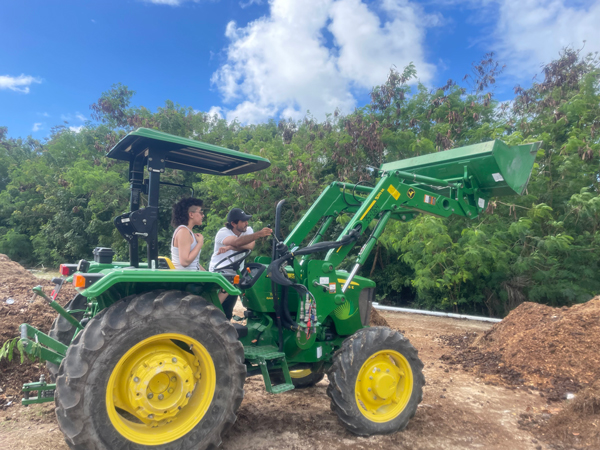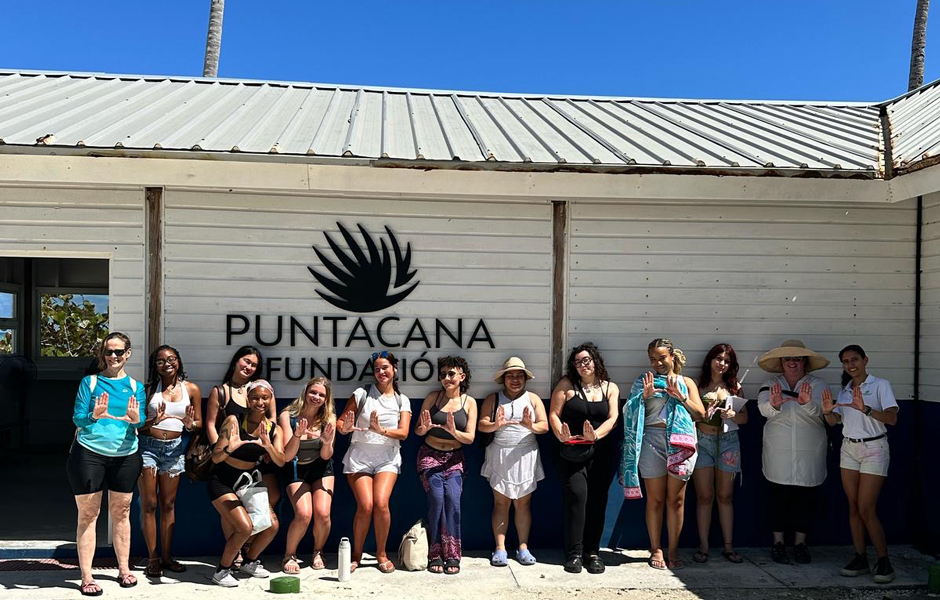Lauren Roach traveled to Punta Cana in the Dominican Republic for spring break, but she wasn't there to lounge on the beach.
Instead, the University of Miami student spent the week at an ecological research center learning about ethnographic field research methods while composting, beekeeping, and participating in other ecological activities.
"It was such an incredible opportunity," Roach said. "It was educational on way more levels than I initially thought it could be."
Over the course of eight days, students in the "Field Studies in Anthropology" course tended to compost piles, cared for hawks, and reconstructed coral reefs, among other activities, all while learning to take detailed ethnographic field notes, a critical skill in the field of cultural anthropology.

"The idea of this research was to embed ourselves, if you will, to do what we call participant observation among the workers and visitors at the ecological research center," explained Claire Oueslati-Porter, a senior lecturer in the Department of Anthropology and the director of the Gender and Sexuality Studies Program at the University of Miami College of Arts and Sciences.
The students learned ethnographic methods from a feminist anthropological perspective. "It's often women who are central to ecological movements and environmental movements, so the students were dedicated to focusing on how the ecological projects that are being done in this foundation are happening—who's doing the labor and the work," Oueslati-Porter explained.
For Roach, who is double majoring in math and economics, the most impactful experience occurred while she was helping tend one of the compost heaps at the research center. On one level, she was learning the science behind composting and how to drive a tractor. But Roach and her classmates were also focused on recording observations related to the power dynamics between the workers with whom they interacted.
Roach recalled a particularly meaningful conversation she had with two Haitian migrant workers who—despite having the same educational background as many of the workers from other Latin American countries who were employed as tour guides at the research center—spent their days turning food waste from nearby resorts into compost, rarely getting the opportunity to interact with visitors.
"It was incredibly special for me to get to bond with these two people who otherwise go ignored throughout their entire day," Roach said. "They're kind of invisible in the work that goes on there."
Oueslati-Porter, whose research areas include labor, gender, and tourism, got the idea for this field school in 2023 when she took students to an all-inclusive resort in Punta Cana to conduct ethnographic field research focused on the intersection of tourism and gender.

"So many students noticed and were asking questions about the environmental impacts of really intensive resort tourism that I started looking around and seeing what kind of environmental movements are happening in beautiful Punta Cana," she explained. That's how she learned about the Fundación Grupo Puntacana Sustainability Center and Marine Laboratory, the ecological research center the students visited over spring break, which was created by a group of resort owners.
Thanks to the generosity of alumni and other donors, the College of Arts and Sciences was able to cover almost all the field school expenses, enabling students to take part in the trip at a minimal cost. While this year's field school was focused on ethnography, the Department of Anthropology has also offered primatology and archeology field schools.
Now that the students are back on campus, they are beginning the work of analyzing their observations. They plan to produce a social science article and create a presentation on their findings.
For Roach, who learned about the class after taking "Introduction to Gender and Sexuality Studies" and participating in an independent research project with Oueslati-Porter, the experience has helped to solidify her interest in pursuing a Ph.D. in economics with a concentration in anthropological applications.
"To be honest, I didn't really feel like grad school was a possibility for me until my experiences with Dr. Oueslati-Porter and her mentorship," she said. "It really opened my eyes and helped to build my confidence in terms of writing."






